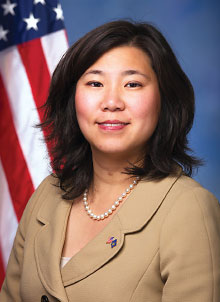Rep. Grace Meng Addresses APA Caucus of Asian American Psychiatrists
Abstract
The congresswoman has worked to end harmful language and hate crimes aimed at Asian and Pacific Islander Americans.

“Any form of discrimination can affect or worsen one’s mental health problems,” said Rep. Grace Meng (D-N.Y.) to the APA Caucus of Asian American Psychiatrists. She was a special guest at the caucus’s quarterly meeting by Zoom in October.
Meng is the author of House Resolution 908, which condemns anti-Asian sentiment related to COVID-19. Known as the Meng Resolution, it was passed by the House of Representatives in September. According to Meng’s press release, “Since the beginning of the coronavirus pandemic, Asian Americans have been forced to endure demeaning and disgusting acts of bigotry and hate, consisting of everything from verbal assaults to physical attacks.”
According to Meng, terms like “Kung-flu virus,” “Chinese virus,” or “Wuhan virus,” particularly when used by national leaders such as President Donald Trump, scapegoat Asian Americans, fuel threats and attacks, and cause many Asian Americans to live in fear of their safety.
Meng explained to caucus members the impetus behind the House resolution. At the beginning of the COVID-19 pandemic, use of anti-Asian terms was not specific to the Republican Party. People in the Democratic Party and liberal media outlets were also using the terms. The original intent of her bill was not political, but to educate leaders and the media about the harmful effects of anti-Asian language.

Rep. Grace Meng proposed a resolution that recently passed the House to educate leaders and the media about the harmful effects of anti-Asian language.
“I never meant for it to be a political piece of legislation,” she said. “We wanted both parties to stand together as leaders, so that the API [Asian and Pacific Islander] community isn’t harmed anymore.” She continued, “Students, senior citizens, and everyone in between—people are really suffering. We probably haven’t even seen a lot of what is to come yet.”
Meng also acknowledged the cultural stigma that Asian and Pacific Islander Americans encounter when seeking mental health services, as well as the linguistic challenge of locating mental health professionals who speak their languages.
“I have thick skin, I’ve been called names, I can survive,” said Meng. She expressed concerns for Asian Americans in areas isolated from the support of Asian American communities, where they may be more susceptible to bullying and cyberbullying, and the impact of anti-Asian words coming from a leader such as the president of the United States.
Steve Sust, M.D., a child psychiatrist at Stanford Children’s Health, acknowledged the aggressive emails that Meng has received due to her resolution. He said that her courage is an example to younger Asian Americans. Velandy Manohar, M.D., chair of the Consumer Engagement and Outreach Committee for the Connecticut Office of Health Strategy, noted the special challenges faced by nursing home residents and the LGBTQ community during the pandemic.
Edmond Pi, M.D., a celebrated psychiatrist on the Committee of 100 Extraordinary Chinese Americans and newly elected secretary for scientific meetings of the World Psychiatric Association, reiterated that without international medical school graduates, the U.S. medical system could not function. He asked Meng’s support in helping to secure the future’s workforce, particularly in the public mental health system. APA CEO and Medical Director Saul Levin, M.D., M.P.A., confirmed that about 25% of the APA membership consists of IMGs.
Caucus members thanked Meng for advocating for the mental health of Asian Americans and expressed the desire for the dialogue to continue. ■



